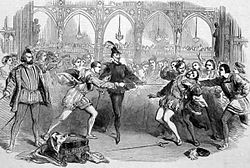Faust (Spohr)
| Work data | |
|---|---|
| Title: | fist |

Production design for an 1852 performance at the Royal Italian Opera |
|
| Original language: | German |
| Music: | Louis Spohr |
| Libretto : | Joseph Carl Bernard |
| Premiere: | September 1, 1816 |
| Place of premiere: | Estates Theater in Prague |
| Playing time: | about 2 hours |
| people | |
|
|
Faust is an opera by the German composer Louis Spohr . The libretto by Joseph Carl Bernard takes up the legend of Faust . It was not influenced by Goethe's Faust , the first part of which appeared in 1808. Instead, Carl Bernard's libretto essentially refers to a play and poem by Friedrich Maximilian Klinger and Heinrich von Kleist . Spohr's Faust is considered an important work in the history of German-language opera, although it is only performed very rarely.
action
Faust cannot choose between his love for young Röschen and Kunigunde, Count Hugo's fiancé. He concludes a contract with the devil Mephistopheles , which enables him to save Kunigunde from the pursuit of the evil knight Gulf. Faust receives a love potion from the hands of the witch Sycorax, which he gives Kunigunde under a pretext during their wedding. Count Hugo, enraged by his bride's sudden change of heart, challenges Faust to a duel. Faust kills him and flees with Kunigunde. When Röschen, Faust's first love, learns of the infidelity, she goes into the water out of desperation. Mephistopheles goes to hell with Faust.
Work history
Spohr had given up his position at the court of Gotha and moved to Vienna , where he worked at the Theater an der Wien , which he had recently acquired from Count Ferdinand Pálffy von Erdöd . He composed the work in less than four months from May to September 1813, but he was unable to come to an agreement with Count Palffy on a first performance in Vienna. He made private contact with Giacomo Meyerbeer , to whom he presented the manuscript. Meyerbeer played and Spohr sang, the passages that were not in his voice he whispered. It was only when Carl Maria von Weber became aware of the play that it was premiered on September 1, 1816 under Weber's direction at the Estates Theater in Prague. The first performance in Berlin was directed by Meyerbeer with Johann Nepomuk Schelble in the role of Faust and Therese Grünbaum as Kunigunde.
According to the original manuscript, Faust was actually a Singspiel in two acts. It was not until 1851 that Spohr turned spoken dialogues into recitatives , thus transforming Faust into a grand opera with three acts. This version was first performed in its Italian translation in London's Covent Garden on July 15, 1852 at the Royal Opera House . After 1931, Faust was played in the original version from 1816 for the first time in 1993 at the Bielefeld Theater under the musical direction of Geoffrey Moull and the direction of Matthias Oldag. In addition to eight performances, it was also recorded for the record label Classic Produktion Osnabrück . The play has been in the repertoire of the Saxony State Theaters since April 2010 .
Recordings
- Faust : Michael Vier, Eelco von Jordis, William Pugh, Diane Jennings, Ion Bric, Claudia Taha; Bielefeld Opera Chorus, Bielefeld Opera choir, Bielefelder Philharmoniker, musical direction: Geoffrey Moull ; cpo 999 247-2, 1993
literature
- The Viking Opera Guide ed. Holden (Viking, 1993)
- The Oxford Illustrated History of Opera ed. Parker (OUP, 1994)
Web links
- Faust at operamanager.it ( Memento from January 25, 2016 in the Internet Archive )
- September 1, 1816: "Faust". In: L'Almanacco di Gherardo Casaglia .
Individual evidence
- ↑ Carl Bernard's libretto draws mainly on Faust plays and poems by Maximilian Klinger and Heinrich von Kleist. In: Opera News , October 1995 (review of the recordings of the two versions by the Bielefelder Philharmonic Orchestra).
- ^ Joseph Bennett, excerpt from Spohr's memoir, "The Great Composers, Sketched by Themselves. No. VII. Spohr (Continued) “ The Musical Times and Singing Class Circular , 21 (August 1, 1880)., P. 394.
- ↑ A picture of the dueling scene appeared on the first page of the Illustrated London News Supplement on July 31, 1852 .
- ^ Theater in Bielefeld 1975–1998, Kerber Verlag, Bielefeld, editors Heidi Wiese, Heiner Bruns, Alexander Gruber, Fritz Stockmeier 1998, ISBN 3-933040-03-5
- ↑ http://www.jpc.de/jpcng/cpo/detail/-/art/Louis-Spohr-Faust-Version-1852/hnum/6780481